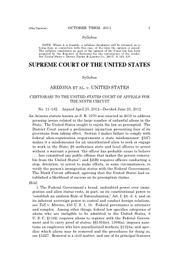Tuesday, June 26, 2012
As with many U.S. Supreme Court rulings, there was a little something for everyone in yesterday's ruling on Arizona's tough anti-immigration law.
On the one hand, the court struck down big chunks of SB 1070, the law that Arizona Gov. Jan Brewer signed in April 2010, including provisions that would have made it illegal for immigrants to apply for jobs and get caught without their authorizing documents. In doing so, justices underscored the fact that only the federal government can determine when to deport someone.
However, justices declined to strike the crux of the law--the portion that required local cops to arrest any person they suspect is in the country illegally. The court's non-action on Section 2(B)--the so-called "show your papers" provision--drew mixed reaction.
Rodney Hunt, president of the Mississippi Federation for Immigration Reform and Enforcement, said SCOTUS delivered an "important victory" for anti-illegal immigration individuals and groups.
"The court made it very clear that state and local governments have an important role to play in enforcing federal immigration laws. Sadly, the Obama administration refuses to enforce many of the laws that Congress has enacted. As a result, states like Arizona have had to step up and discourage illegal aliens from remaining within their borders and harming their citizens," Hunt said in a statement.
Bear Atwood, legal director for the Mississippi American Civil Liberties Union, explained at a news conference yesterday that the Supreme Court did not uphold "show me your papers," but deferred judgment. The justices couldn't rule until a lower federal court ruled on the question of pre-emption. That is, whether Arizona usurped the federal government's authority to regulate immigration.
By delaying a pre-emption ruling, Atwood said the court "put the people of Arizona and any state passing such a law at risk for (charges of) racial profiling."
Bill Chandler, executive director of the Jackson-based Mississippi Immigrant Rights Alliance, said Arizona's bills and similar proposals violate American values and interests by promoting racial profiling and denying equal justice.
Chandler said he fears that some law enforcement agencies might misinterpret SCOTUS' failure to rule on "show me your papers" as permission to step up racially discriminatory profiling.
"The decision is so confusing even the Wicked Witch of the West thinks it's a good decision," Chandler told the Jackson Free Press.
Far less confusing was another significant ruling that was overshadowed by the immigration debate. In 5-4 ruling, the court overturned a ruling that would have set campaign spending limits in Montana, where the state's supreme court said that corporate campaign contributions led to government corruption.
Citing the 2010 landmark Citizens United ruling that made way for unlimited spending in federal political races, the court's conservative majority said "there can be no serious doubt that" Citizens United also applies to state elections.
In a brief dissenting opinion, Justice Stephen Breyer wrote: "Even if I were to accept Citizens United, this Court's legal conclusion should not bar the Montana Supreme Court's finding, made on the record before it, that independent expenditures by corporations did in fact lead to corruption or the appearance of corruption in Montana."


Comments
donnaladd 11 years, 10 months ago
If you'd like to read the Supreme Court decision on Arizona's immigration law, there's a viewer in the story above.
Sign in to comment
Or login with:
OpenID